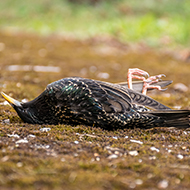Hundreds of birds found dead in Rome

"It can be that they died from fear" - International Organization for the Protection of Animals.
Animal welfare campaigners are calling for a ban on fireworks after hundreds of birds were found dead on the streets of Rome, Italy, on New Year's Day.
Video footage circulating online shows the birds - many of which are starlings – lying on the ground near the city's Termini Train station. Although it is not exactly clear how the birds died, the International Organization for the Protection of Animals (OIPA) has attributed the deaths to fireworks.
A spokesperson for the organisation said: "It can be that they died from fear. They can fly up together and knock against each other, or hit windows or electric power lines. Let's not forget they can also die of heart attacks."
The spokesperson added that fireworks cause stress and injury to wild birds and other animals - and the unusual amount of deaths occurred despite the city-wide ban on personal fireworks displays.
The OIPA is now calling for a complete ban on the sale of fireworks and firecrackers, but the RSPB says there is little evidence to suggest that fireworks harm wild birds or affect their conservation status.
A statement on the RSBP's website reads: 'Available information suggests that the effect of firework displays on birds is little different from that of a thunderstorm. However, we will continue to monitor the situation and research to ensure the best course of action for wild bird conservation.
'Setting off fireworks close to nesting and roosting birds can cause disturbance. To minimise any adverse impact of fireworks on birds, we urge organisers of firework displays to avoid launching the rockets near to sensitive wildlife areas, such as nature reserves, and nesting and roosting sites for wild birds.'



 The Veterinary Medicines Directorate (VMD) is inviting applications from veterinary students to attend a one-week extramural studies (EMS) placement in July 2026.
The Veterinary Medicines Directorate (VMD) is inviting applications from veterinary students to attend a one-week extramural studies (EMS) placement in July 2026.